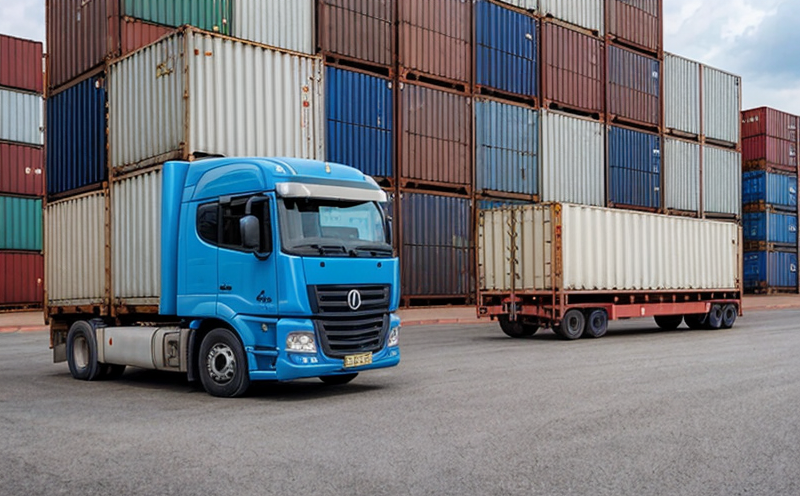
-
Transportation and Logistics Certification-
Certification for International and Global Logistics-
Certification for Export Logistics and Customs Regulations
We provide comprehensive solutions designed to help our clients mitigate risks, enhance performance, and excel in key areas such as quality, health & safety, environmental sustainability, and social responsibility.
Discover
For many years, our organization has been operating successfully, boasting modern laboratories that meet international standards. These laboratories are equipped with the latest technology devices and equipment, and we have built a strong team of experienced and trained personnel to operate them.
DiscoverWelcome to Eurolab, your partner in pioneering solutions that encompass every facet of life. We are committed to delivering comprehensive Assurance, Testing, Inspection, and Certification services, empowering our global clientele with the ultimate confidence in their products and processes.
Discover
-
Transportation and Logistics Certification-
Certification for International and Global Logistics-
Certification for Export Logistics and Customs RegulationsCertification for Export Logistics and Customs Regulations
Export logistics is a complex process that involves coordinating the movement of goods from one country to another while ensuring compliance with customs regulations, laws, and standards. With the increasing global trade volumes, export logistics has become a critical component of international business operations. In this article, we will delve into the importance of certification for export logistics and customs regulations, highlighting key aspects and providing detailed explanations in bullet point format.
Importance of Certification
Certification is essential for export logistics as it ensures that all necessary documentation, permits, and licenses are obtained to facilitate smooth movement of goods across borders. Without proper certification, exporters may face delays, fines, or even confiscation of their shipments. The consequences of non-compliance with customs regulations can be severe, resulting in loss of revenue, damage to reputation, and potential legal actions.
Here are some reasons why certification is crucial for export logistics:
Compliance with Regulations: Certification ensures that all relevant laws, regulations, and standards governing exports are met. This includes obtaining necessary permits, licenses, and documentation required by the importing country.
Risk Management: Certification helps exporters manage risks associated with non-compliance, such as fines, penalties, and confiscation of goods.
Increased Efficiency: Proper certification streamlines export logistics processes, reducing the likelihood of delays, errors, or missed shipments.
Enhanced Security: Certification contributes to enhanced security measures, ensuring that exported goods comply with regulations governing controlled items.
Customs Regulations: Key Aspects
Customs regulations vary from country to country, and exporters must familiarize themselves with specific requirements. The following are key aspects of customs regulations:

Pressure Vessels and Installations Testing
Pressure Vessels and Installations Testing Pressure vessels are a critical component of various ind...

Environmental Impact Assessment
Environmental Impact Assessment: A Comprehensive Guide Environmental Impact Assessment (EIA) is a c...

IT and Data Center Certification
IT and Data Center Certification: Understanding the Importance and Benefits The field of Informatio...

Pharmaceutical Compliance
Pharmaceutical compliance refers to the adherence of pharmaceutical companies and organizations to l...

Agricultural Equipment Certification
Agricultural equipment certification is a process that ensures agricultural machinery meets specific...

Food Safety and Testing
Food Safety and Testing: Ensuring the Quality of Our Food As consumers, we expect our food to be sa...

Electrical and Electromagnetic Testing
Electrical and Electromagnetic Testing: A Comprehensive Guide Introduction Electrical and electrom...

Automotive Compliance and Certification
Automotive Compliance and Certification: Ensuring Safety and Efficiency The automotive industry is ...

Construction and Engineering Compliance
Construction and Engineering Compliance: Ensuring Safety, Quality, and Regulatory Adherence In the ...

Military Equipment Standards
Military Equipment Standards: Ensuring Effectiveness and Safety The use of military equipment is a ...

Environmental Simulation Testing
Environmental Simulation Testing: A Comprehensive Guide In todays world, where technology is rapidl...

Trade and Government Regulations
Trade and government regulations play a vital role in shaping the global economy. These regulations ...

MDR Testing and Compliance
MDR Testing and Compliance: A Comprehensive Guide The Medical Device Regulation (MDR) is a comprehe...

NEBS and Telecommunication Standards
Network Equipment Building System (NEBS) and Telecommunication Standards The Network Equipment Bu...

Battery Testing and Safety
Battery Testing and Safety: A Comprehensive Guide As technology continues to advance, battery-power...

Hospitality and Tourism Certification
Hospitality and Tourism Certification: Unlocking Opportunities in the Industry The hospitality and ...

Chemical Safety and Certification
Chemical safety and certification are critical in ensuring the safe management of products and proce...

Transportation and Logistics Certification
Transportation and Logistics Certification: A Comprehensive Guide The transportation and logistics ...

Industrial Equipment Certification
Industrial equipment certification is a critical process that ensures industrial equipment meets spe...

Lighting and Optical Device Testing
Lighting and Optical Device Testing: Ensuring Performance and Safety Lighting and optical devices a...

Railway Industry Compliance
Railway Industry Compliance: Ensuring Safety and Efficiency The railway industry is a critical comp...

Aviation and Aerospace Testing
Aviation and Aerospace Testing: Ensuring Safety and Efficiency The aviation and aerospace industr...

Renewable Energy Testing and Standards
Renewable Energy Testing and Standards: Ensuring a Sustainable Future The world is rapidly transiti...

Product and Retail Standards
Product and Retail Standards: Ensuring Quality and Safety for Consumers In todays competitive marke...

Energy and Sustainability Standards
In today’s rapidly evolving world, businesses face increasing pressure to meet global energy a...

Cosmetic Product Testing
The Complex World of Cosmetic Product Testing The cosmetics industry is a multi-billion-dollar ma...

Healthcare and Medical Devices
The Evolution of Healthcare and Medical Devices: Trends, Innovations, and Challenges The healthcare...

Electromechanical Safety Certification
Electromechanical Safety Certification: Ensuring Compliance and Protecting Lives In todays intercon...

Fire Safety and Prevention Standards
Fire Safety and Prevention Standards: Protecting Lives and Property Fire safety and prevention stan...

Consumer Product Safety
Consumer Product Safety: Protecting Consumers from Harmful Products As a consumer, you have the rig...